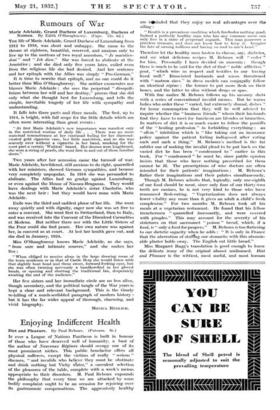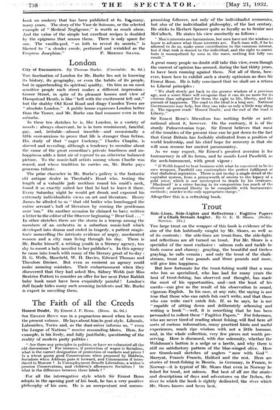Enjoying Indifferent Health
Diet and Pleasure. By Paul Reboux. (Putnam. Cs.)
IF ever a League of Nations Pantheon is built in honour of those who have deserved well of humanity, a bust of the author of Nouveaux Regimes should occupy one of its most prominent niches. This public benefactor offers all physical sufferers, except the victims of really " serious " diseases, " and invalids who believe they must be obstinate and drink nothing but Vichy Ater," a succulent selection of the pleasures of the table, complete with a week's menus appropriate to their disorders. M. Paul Reboux expounds the philosophy that every time we are attacked by some bodily complaint ought to be an occasion for rejoicing over its gastronomic compensations. The aggressively healthy are rainded that they enjoy no real advantages over the ailing :
" Health is a precarious condition which forebodes nothing good. Indeed a perfectly healthy man who has any common sense can only live in a state of perpetual anguish. This man possesses a priceless treasure, and does not know how to keep it. Imagine the fate of owning millions and having no roof to one's head."
Therefore let the healthy man hasten to choose, say, diabetes, and see what delicious recipes M. Reboux will " order " for him. Personally I have decided on anaemia ; though there is much to be said for the diet of that " noble affliction " gout, which wins us respect and testifies to our having lived well." Emaciated husbands and wives threatened with " matron sizes " in dress models can conjugally follow an identical regime : the former to put more flesh on their bones, and the latter to slim without drugs or spas.
With fine malice M. Reboux follows up his savoury diets with a series of conventional invalid menus. But he warns ladies who order these " varied, but extremely dismal, dishes " for home consumption that they will be well advised to inquire whether the business friends " whom their husbands find they have to meet for luncheon are blondes or brunettes. In matters of diet it is so much easier to follow the pontiffs of the healing profession " in forbidding everything : an " all-in " inhibition which is " like taking out an insurance policy against the patient feeling indisposed after eating such and such a thing." M. Reboux's method is the far subtler one of making the invalid plead to be put back on the varied diet he has been " condemned to " earlier in this book. For " condemned " he must be, since public opinion insists that those who have nothing prescribed for them cannot be ill. The prescriptions of wise doctors are often intended for their patients' imaginations ; M. Reboux's flatter their imaginations and their palates simultaneously.
Though M. Reboux admits that, logically, only one-eighth of our food should be meat, since only four of our thirty-two teeth are canines, he is not very kind to those who have renounced flesh-eating. " Vegetarianism does not always lower vitality any more than it gives an adult a child's fresh complexion." For two months M. Reboux took all his meals at a vegetarian restaurant. He found that his fellow trenchermen " quarrelled incessantly, and were covered with pimples." This may account for the severity of his strictures on that sacrosanct " poison " bread, which, if a food, is " only a food for paupers." M. Reboux is too flattering to our dietetic sagacity when lie adds : " It is only in France that the aberration of studng our stomachs with this abomin- able plaster holds sway. The English eat little bread."
Miss Margaret Itagg's translation is good enough to leave the delicate irony of the original almost undimmed. Diet and Pleasure is the wittiest, most useful, and most human
hook on cookery that has been published at 6s. foikpmany, many years. The story of the Vase de Soissons, or the selected example of " Medical Negligence," is worth as much alone. And the value of the simple but excellent recipes is doubled by the epigrams that season them. There is only space for one. The vanilla-pod, " so loth to reveal its secrets," is likened to " a slender creole, perfumed and wrinkled as the





































 Previous page
Previous page